Tech N9ne Fan Miraculously Comes Out Of Coma, Beats The Odds
Sep 16 2010
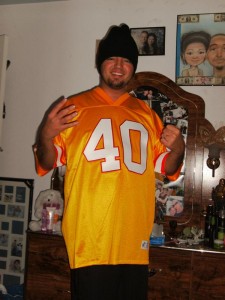 Michael R. Hall can still vividly remember the first time he ever heard Tech N9ne. A DJ and beatmaker on the side, he purchased a crate of a hundred CDs on wholesale hoping to stumble on some gems to sample and put in his rotation. Being a west coast native, Michael had centered his purchase on records from the midwest and the south, hoping to familiarize himself with scenes that he had yet to discover. Listening to his new batch in his Paso Robles garage, which doubled as his studio, he attentively sifted through the albums. One of them was titled Celcius, an album of Tech N9ne material that was released after he had parted ways with Midwestside Records. It was when the CD player hit track three, a track called “Be Warned,” that Michael knew he had found something special: “I was thinking that this was the baddest motherfucker that I ever heard! Right then I was like ‘this guy is going to be my favorite rapper.'” With his eyes widened and his head cocked up, Michael listened to Tech rip the Exorcist-sampled beat with authority and had the song memorized right after he heard it.
Michael R. Hall can still vividly remember the first time he ever heard Tech N9ne. A DJ and beatmaker on the side, he purchased a crate of a hundred CDs on wholesale hoping to stumble on some gems to sample and put in his rotation. Being a west coast native, Michael had centered his purchase on records from the midwest and the south, hoping to familiarize himself with scenes that he had yet to discover. Listening to his new batch in his Paso Robles garage, which doubled as his studio, he attentively sifted through the albums. One of them was titled Celcius, an album of Tech N9ne material that was released after he had parted ways with Midwestside Records. It was when the CD player hit track three, a track called “Be Warned,” that Michael knew he had found something special: “I was thinking that this was the baddest motherfucker that I ever heard! Right then I was like ‘this guy is going to be my favorite rapper.'” With his eyes widened and his head cocked up, Michael listened to Tech rip the Exorcist-sampled beat with authority and had the song memorized right after he heard it.
From that point it was on: Michael would go on to attend numerous Tech N9ne shows when Tech would arrive out west, taking his wife Linda, his little brother Cody, and Linda’s younger sister Kandy along with him to a show who all became avid listeners. Michael dedicated his entire iPod to Tech N9ne’s music, referred to as his “Tech Deck”, and also transformed his 68 Schwinn into a “Tech Cruiser” with a seat that opened up to reveal the Snake and Bat logo. His continuous and ardent fanship with Tech N9ne was reciprocated with love during the Meet and Greet sessions (“I’m always VIP”) where he was able to kick it with Tech and the rest of the Strange crew before the shows. It’s a variation of a common story all over from die-hard fans who have grown to love and admire the emcee who has claimed the throne as most the successful independent hip hop artist in the world. Soon however, Michael’s story would take a tragic turn that would forever change his life and the lives of his family.
Michael had been living a normal, well-adjusted, and happy life. He had friends and family that cared for him and interests such as music and sports to keep him busy and satisfied. Always a guy with a good sense of humor and affable disposition, he has been well-liked and respected across the board for his whole life, as his younger sister Cassandra would attest:
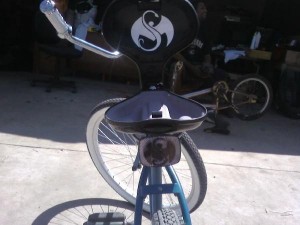 “Michael is a funny guy–he makes anybody laugh. He’ll do anything for you and he doesn’t expect anything in return. I don’t think there’s many people that don’t like Michael. He’s just an awesome guy to be around. Just yesterday I walked into a store and a guy asked me ‘are you Michael Hall’s sister?’ Everybody knows Michael and it’s just because he’s a really likable guy. He just likes to have fun and enjoy life.”
“Michael is a funny guy–he makes anybody laugh. He’ll do anything for you and he doesn’t expect anything in return. I don’t think there’s many people that don’t like Michael. He’s just an awesome guy to be around. Just yesterday I walked into a store and a guy asked me ‘are you Michael Hall’s sister?’ Everybody knows Michael and it’s just because he’s a really likable guy. He just likes to have fun and enjoy life.”
Michael married Linda, his high school sweetheart, and joined the US Marine Corps soon after graduation. Two years into his stint with the Marines, a repelling incident shattered his foot and he was deemed untrainable, an incident that Michael’s mother Debra Taylor admits made her glad, as Michael was nearing departure to Iraq. Michael picked up work with his uncle doing metal-framing for hospitals, ironically a motif he would become all too familiar with.
It was in 2007 that Michael recieved his heart transplant. On a hot summer day in August Michael was working construction when he fainted on the job. Michael, a former varsity football star and specimen of physical fitness, had never had something like this happen to him before. His uncle told him he needed to visit the doctor immediately. During the check up they discovered a blood clot in his left ventricle. His new cardiologist recommended him to Stanford. Michael was transported three-and-a-half hours in an ambulance to Stanford where he would get a defibulator (pacemaker) put in to keep his heart at a steady beat.
Soon later, Michael and Linda were about to head to the movies, something he wasn’t able to do for awhile from being sick and bed-bound. On the way out the door LInda asked Michael if the phone was ringing. Michael said no, but Linda had a gut feeling to check the phone. The ringer was off but lo and behold, Stanford University Hospital was on the line with the news. It was the call Michael had nervously been awaiting for five months. Stanford had found a perfect match for his heart transplant. Michael would immediately be required to be at the hospital. As he was rushed to the hospital he vomited out of sheer panic and nerves. It was a three hour drive. He had arrived only to wait 36 hours for his heart to arrive.
It turned out he could have died any day from congestive heart failure. When they cut open his chest the doctors would discover his heart had grown to the size of a football. The operation, which also required the removal of the pacemaker installed on the left side of his chest, went underway and was a success. Luckily, Michael, the fighter that he is, took well to the procedure and left the hospital eight days later, able to resume his normal life.
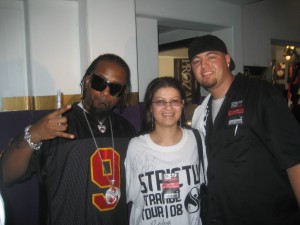 For the next few years things were smooth. Michael kept up with his love for music, attending Tech N9ne’s Misery Loves Company and Strictly Strange concerts and copping all the Strange Music releases as soon as they hit the shelves. It had seemed that the worst was behind him and all he had to do was look forward to a full life with his loving wife and family but as fate would have it, Michael and his relatives had yet to endure the toughest challenge they could possibly imagine. Around the beginning of this year Michael had been complaining of lower back pain and fits of coughing and wheezing. Michael saw a doctor at the local community health center, whose ineptitude led him to believe that Michael was experiencing simple bronchitis. He was prescribed an antibiotic and sent home.
For the next few years things were smooth. Michael kept up with his love for music, attending Tech N9ne’s Misery Loves Company and Strictly Strange concerts and copping all the Strange Music releases as soon as they hit the shelves. It had seemed that the worst was behind him and all he had to do was look forward to a full life with his loving wife and family but as fate would have it, Michael and his relatives had yet to endure the toughest challenge they could possibly imagine. Around the beginning of this year Michael had been complaining of lower back pain and fits of coughing and wheezing. Michael saw a doctor at the local community health center, whose ineptitude led him to believe that Michael was experiencing simple bronchitis. He was prescribed an antibiotic and sent home.
The symptoms did not stop and showed no signs of slowing. In fact, Michael felt progressively worse as the week went on. At the end of the week he visited Stanford Hospital who admitted him right then and there. Two days later Michael flatlined. As it turned out, Michael had been experiencing a heart rejection which was only accelerated with the antibiotics he was prescribed with a week prior. The doctor’s were able to revive him but it was only the start of worse news to come. Michael’s family had come to visit him after his admittance, including his mother, his brother, and sister. During one of the visits, as only two people were allowed to see him at a time, Debra, upon hearing the worst thing a mother could ever hear, left Michael’s hospital room in tears. Cassandra vividly recalls that day:
“We all had to take turns. I was with my son in the waiting area when my mom came back crying and told us that he might not make it. They told us if his liver and his kidneys don’t turn around that he’s not going to make it and that they’ve never had a survivor make it at the rate he was going and as far as the rejection was going.”
Despite the immense pressure and impending doom that permeated the room, Cassandra and the rest of Michael’s family held on, refusing to give up hope: “It was hard. It was a shocker. He was doing good and all of the sudden they were telling us he wasn’t going to make it. It was hard because I didn’t want to sit there and ball my eyes out. I felt like if I cried then I was giving up on him and I was giving up on my mom because I had to be there for her because obviously Michael couldn’t. We all came together and said he’s going to make it no matter what.”
It had been determined that Michael’s heart rejection was going to require a new and unproven procedure to fix. Because invasive surgery usually results in infection, bleeding, and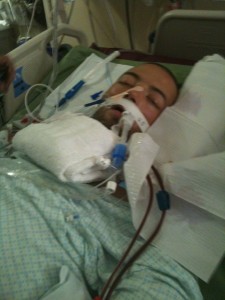 eventual death, the doctors at Stanford hospital did their first attempts on Michael for an experimental and non-invasive procedure. Michael would require a pump installed into his femur that would channel the blood out that his heart was unable to handle. For the next three weeks, Michael would be in a drug-induced coma.
eventual death, the doctors at Stanford hospital did their first attempts on Michael for an experimental and non-invasive procedure. Michael would require a pump installed into his femur that would channel the blood out that his heart was unable to handle. For the next three weeks, Michael would be in a drug-induced coma.
During this time all Michael’s family could do was wait and see. During his visit on Superbowl Sunday, Michael’s little brother Cody said that Michael would probably rather be listening to his favorite music than anything else. For hours at a time, in an attempt to wake Michael up so he could watch the Super Bowl with his brother, Cody sat at Michael’s bedside and played him Tech N9ne through his cellphone: “They say when you’re in a coma you can still hear people talk. I figured instead of hearing everybody’s voice he’d rather listen to some Tech N9ne.”
On the twenty-fourth day of his coma, Michael awoke. The procedure worked, and despite the odds, things were looking up. Coming out of the coma resulted in many hallucinations for Michael–often humorous and sometimes frightening to him. Someone had brought him a stuffed monkey which led him to believe that monkeys were flying all around the hospital. Michael’s 16-year-old niece was too young to visit him which upset Michael: “you’ll let a fucking monkey in my room but not my niece!?” Michael had also been convinced that he was being chased by werewolves who were after him because he killed one of their own. When the doctors asked him where he was, Michael would continually change his answer: Pismo Beach…Avala Beach…Morro Bay…Grover Beach (“I guess werewolves don’t like the beach” Michael quipped). To add to his werewolf-paranoia, during an episode of CSI Miami Michael saw that they had found the werewolf that he killed. His wife would later attest that he had a full-blown conversation with the cast of CSI to find out what they knew about the case. The last hallucination Michael could remember having involved none other than his favorite MC, Tech N9ne:
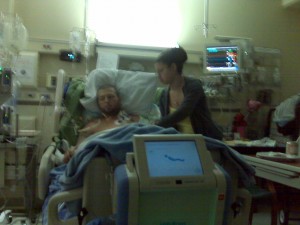 “I got to listen to my Tech Pod. After awhile of listening Linda left the room and went out to the lobby with all the family. I was alone. My batteries were dying so I turned it off and then all of the sudden Tech N9ne walked in and I was having a conversation with him. It sucks because I don’t remember what I was talking about because I was alone. He left just as my mom walked in and she wanted to know who I was talking to. I told her ‘Tech N9ne.’ She told me he wasn’t there. That’s when I told her ‘Oh yeah, then why are we going to go kick it tonight?’ She started laughing and told me I was in the hospital. That made me mad so I just went to sleep.”
“I got to listen to my Tech Pod. After awhile of listening Linda left the room and went out to the lobby with all the family. I was alone. My batteries were dying so I turned it off and then all of the sudden Tech N9ne walked in and I was having a conversation with him. It sucks because I don’t remember what I was talking about because I was alone. He left just as my mom walked in and she wanted to know who I was talking to. I told her ‘Tech N9ne.’ She told me he wasn’t there. That’s when I told her ‘Oh yeah, then why are we going to go kick it tonight?’ She started laughing and told me I was in the hospital. That made me mad so I just went to sleep.”
Stanford gave Michael an award of recognition for him being the first one to undergo their experimental non-invasive procedure. Now the procedure is being used on patients in the same condition with greater amounts of success than regular surgery because of Michael’s case. Soon later the doctor’s found spores in his lungs that would be diagnosed as Valley Fever, a fungal lung disease that is endemic in the western regions of America. This delayed his hospital leave a little longer, but in April he was finally able to return to his wife at home in Paso Robles, California.
Since Michael’s heart rejection and miraculous recovery, things have understandably changed for Michael and his family: “The family, basically we’ve been through hell. It’s changed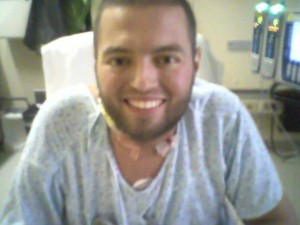 our outlook on donating and the whole situation of my son being a recipient. There’s been a lot of ups and a lot of downs,” said Debra, a testament to a mother’s unyielding strength and refusal to give up on her child, no matter what the odds. “He’s not really a lovey-dovey type of person but now every time I leave he’ll hug me and say goodbye,” she added, noting the tighter-knitted feeling that has since swept through the family. Cassandra has also noticed the change:
our outlook on donating and the whole situation of my son being a recipient. There’s been a lot of ups and a lot of downs,” said Debra, a testament to a mother’s unyielding strength and refusal to give up on her child, no matter what the odds. “He’s not really a lovey-dovey type of person but now every time I leave he’ll hug me and say goodbye,” she added, noting the tighter-knitted feeling that has since swept through the family. Cassandra has also noticed the change:
“He’s not the type to call and say ‘hey, how you doing?’ but he’s been texting a lot more lately and been more involved. I’ve seen him every day since I stopped in town to visit him. We just watched a movie together and before he wouldn’t of done that. I think we’ve all changed.”
Many members of the family believe that Tech N9ne was a convalescent in Michael’s recovery: “He loves Tech N9ne so much,” Debra said, “I think it helped him. I can’t say how but you could just see it. He likes his music and it soothes him.” Michael adds his two cents: “His music helps me relax. You get cabin fever sitting in the hospital all day. It just made me feel like I wasn’t in the hospital.”
When asked if there was anything they would want to say to Tech, the various family members responded:
“Thanks for the good music and helping my brother pull through. Keep it coming,” said Cody.
“All his concerts in this area–my son went and went backstage and met him. I would say thank you for that and for giving his time. That means a lot to Michael,” said Debra.
“Never go mainstream!” Michael aptly puts it.
Michael currently is residing in Shandon, California with his wife Linda and is looking forward to the next time Strange Music goes out west. For the rest of his life he will take medication and antibiotics for his Valley Fever, and requires monthly visits to the hospital to keep tabs on his health, but for him and the rest of his family, it finally looks that the worst is behind them. Now all Michael is looking forward to is Tech’s upcoming release, The Gates Mixed Plate:
“Tech always comes out with the hardest flows. Since they’re always bangin’, I’m always going to have them hittin’ in my trunk.”
